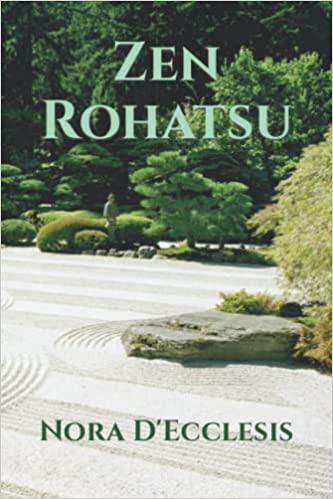Could an ancient practice hold the key to dealing with today’s stressors? Zen meditation practitioner Nora D’Ecclesis opens her new book, Zen Rohatsu, with a guided visualization that places readers at the time of the Buddha, under the sacred fig tree, as he sought to obtain enlightenment.
“Buddha was a man who found his enlightenment and set his path, avoiding suffering by controlling his thoughts and desires,” wrote D’Ecclesis. “He was not and is not considered a deity.”
And with this historical perspective into how the concept of Buddhist enlightenment emerged, D’Ecclesis sets the stage for Zen Rohatsu, which provides thoroughly researched insights into the origins of meditation, its rituals and the ways in which living mindfully can be transformative. Included are simple meditation techniques, such as postures, breathing exercises and the use of mala beads.
Written for anyone wanting to cultivate a deeper sense of mindfulness and spirituality — from beginners to advanced meditation practitioners — Zen Rohatsu guides readers down the proverbial path of enlightenment.
“Zen Rohatsu is a microcosm of Zen meditation which best explains why we meditate and why most should consider this spiritual practice,” D’Ecclesis said. “I sat to outline a story about my spiritual practice, which I wrote from the memory of my own experiences as a lay meditator. The result is this book.”
The book explains that Rohatsu is a spiritual practice of meditative zazen that occurs on the eighth day of the twelfth month on the Gregorian calendar. The meditation sessions, which focus on Zazen Meditation rather than scriptures or rituals, are celebrated for seven days in advance of December 8 by Zen practitioners all over the world. Zen Rohatsu will help readers understand this type of meditation and how it might help them.
D’Ecclesis also added: “Zazen, a Japanese style dating back to the Buddha, is a meditation that keeps us in the present with focus, equanimity and stress management by clearing our thoughts from the various anxieties that permeate them. We turn off the chatter in our own heads and establish a place of compassion. We all experience interoceptive responses to the stressors and suffering and even the great joys in life, as all sentient beings do, so the balance of meditation and concept of equanimity are a welcome alternative.”
Nora D’Ecclesis is an American bestselling nonfiction author and Haiku poet. Her international No.1 bestseller The Retro Budget Prescription held the top spot in Kindle book downloads for the business/self-help category for over a year. She is a graduate of Kean University of New Jersey with post graduate degrees in administration and education. Her other published nonfiction includes Amazon No. 1 bestseller Haiku: Natures Meditation and paperbacks/eBooks on such topics as time management, guided visualizations, gratitude/equanimity, journaling and Zen meditation.
For more information about the author, visit https://noradecclesis.com/, or follow her on Twitter at @DECCLESIS or on Facebook at NoraDEcclesis.

